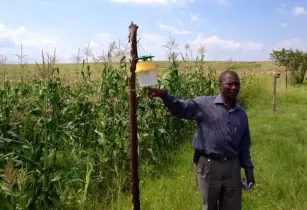The UN Food and Agriculture Organisation (FAO) and Pennsylvania State University have joined forces to develop and launch a talking app, Nuru, to help African farmers recognise Fall Armyworm
With the new application, Africa farmers can hold the phone next to an infested plant and Nuru can immediately confirm if Fall Armyworm has caused the damage.
According to FAO, Nuru uses cutting-edge technologies involving machine learning and artificial intelligence to immediately spot if Fall Armyworm has affected the plant.
Fall Armyworm first appeared in Africa in 2016, in West Africa, and then rapidly spread across all countries in sub-Saharan Africa in 2017, infecting millions of hectares of maize, and threatening the food security of more than 300 million people.
“The new tool will help farmers recognise their new enemy and take immediate measures to stop it. It complements FAO's recently launched Fall Armyworm Monitoring and Early Warning System (FAMEWS) mobile app, which builds knowledge on how and where the pest spreads, and what makes it less damaging,” said Keith Cressman, senior agricultural officer at FAO.
New Feature
FAO and Pennsylvania State University are working on new features to make Nuru a more powerful ally against Fall Armyworm in the next months.
In addition to English, Nuru will be speaking to farmers in their own language, walking them through the process of checking their crops for Fall Armyworm, reporting back on infestation levels and giving them advice on how to fight the pest. Nuru will speak Swahili, French and Twi and will be learning new languages all the time.
Allan Hruska, principal technical coordinator on the Fall Armyworm response at FAO, noted, “Digital tools are increasingly becoming integral components of the FAO's systems of identification, monitoring, training and decision-making of globally-important crop pests and diseases.”





